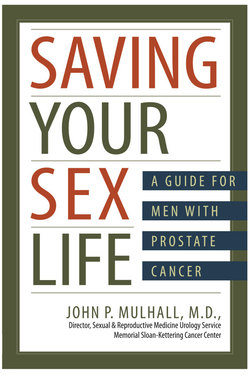Читать книгу Saving Your Sex Life: A Guide for Men With Prostate Cancer - John P. Mulhall - Страница 13
На сайте Литреса книга снята с продажи.
VI. Sexual Difficulties are Common
ОглавлениеIt is estimated that 50% of men over the age of 40 have erectile dysfunction. This is defined as the persistent inability to get and/or keep an erection sufficient for satisfactory sexual relations. The older a man gets, and the more medical problems he has (in particular, conditions such as high blood pressure, diabetes, high cholesterol, coronary artery disease and cigarette smoking exposure), the more likely he is to develop erectile dysfunction. Erectile dysfunction rates are estimated to be approximately 20% at 40 years of age and 70% at 75 years of age, with about 5% of 40–year-olds being completely unable to have sexual intercourse and 25% of 75–year-olds likewise. In contrast to what most people think, most men who have erectile dysfunction do not have a complete inability to have sexual intercourse. Indeed in the ED drug (Viagra, Levitra and Cialis) trials, something in the range of 25 to 30% of attempts before a man went on the trial drug resulted in the ability to have intercourse. However, the presence of erectile dysfunction is associated with a dramatic reduction in the man’s quality of life, which doesn’t just affect his function in the bedroom, but also affects his self-esteem and self-confidence and may carry over into his activities of daily living.
By far, the medical condition that is worst to have for erectile function is diabetes. Diabetes affects not just the blood vessels, but the erection nerves also, causing failure of the nerves to function properly and the health of the erectile tissue, which undergoes scarring. All of these issues cause problems with erection.
Other causes of erectile dysfunction include hormone problems, such as low testosterone and thyroid disease, neurological problems such as Parkinson’s disease, stroke, and lumbar disc disease, medications (in particular blood pressure medications and depression medications) and, of course, surgery. The surgeries that are most likely to cause erection problems are radical prostatectomy, radical cystoprostatectomy (for bladder cancer) and radical rectal surgery (for rectal cancer). Having described the anatomy previously, it is easy to understand how these surgeries may have a negative impact upon erections given the interference with the blood flow and nerves supplying the penis. The incidence of erectile problems after radical prostatectomy and pelvic radiation is very variable depending upon which literature you read. For example, after prostatectomy for prostate cancer, the erectile dysfunction rates in the literature range from 20 to 90%. Saying that, it is routine for the vast majority of patients in the early stages after radical prostatectomy to have some significant reduction in erectile function, at least temporarily. Recovery of erectile function after surgery may take 12 to 24 months and probably only 15% of men will have recovery of the same erection hardness after surgery that they had before surgery, at least without the use of medication. Likewise, the literature tells us that the incidence of erectile dysfunction after radiation therapy is highly variable, with rates ranging from 30 to 70%.
As I do not have a vested interest in which treatment you choose (as I do not perform prostatectomies or coordinate prostate radiation), throughout this book, I will call it as I see it! I believe that the medical literature is not likely, in its current format, to represent the true extent of erectile dysfunction after radiation therapy for prostate cancer. In contrast to surgery, it is the minority of patients in the first year after radiation who run into erectile function problems, but erectile dysfunction rates peak probably somewhere between three and five years after the completion of radiation.Understanding that there are no studies that compare radiation to surgery at the same center (absence of a randomized study), my review of the current literature suggests that the incidence of erectile dysfunction three years after both radical prostatectomy and prostate radiation are approximately the same. Thus, when I see patients who are deciding which intervention to pursue, surgery or radiation, I always tell them the same thing, “You should never base your decision on which intervention to choose on your future sexual function as it appears that the chances of you developing erection problems three years after both is approximately the same.”
